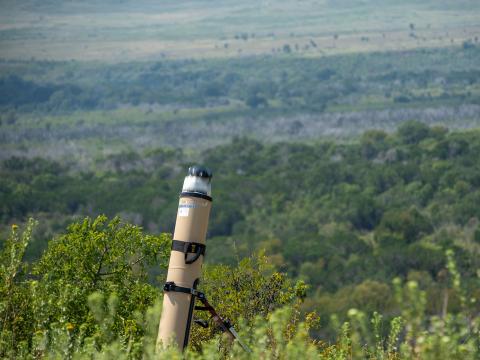Army Rapid Equipping Force Opening Office in Kuwait
The U.S. Army’s Rapid Equipping Force (REF), which quickly fields technologies to meet urgent warfighter needs, intends by the end of November to open an office in Kuwait that will serve warfighters in the Middle East and Southwest Asia. Furthermore, officials are considering the possibility of opening an office in Iraq.
The new presence in the Army Central area of responsibility will augment the REF’s shrinking presence in Afghanistan while providing the service the flexibility it needs to meet any future operations in the Army Central area of responsibility, which stretches from Central Asia to North Africa. “Many organizations that are supporting Afghanistan, because of the drawdown, are finding ways to serve over the horizon,” explains Col. Steven Sliwa, USA, REF director. “At the current moment, I’m going to still have a presence in Afghanistan, but it is extremely limited.”
The REF already has a liaison officer in place in Kuwait. For operational security reasons, Col. Sliwa declines to disclose the number of personnel for the new office, but he says it will be scaled to the need and will ensure the service is poised for the future. “Without being naïve about what’s happening north of Kuwait, we’re prepared to support there as necessary,” he says.
In fact, opening a small office is Iraq sometime in the future is not out of the question, he says. “I don’t know what the future holds for Iraq, but it’s not inconceivable that we could have a small presence there, if it is required,” Col. Sliwa states. He recalls that the REF once had offices in both Iraq and Kuwait before the drawdown of U.S. forces in the region.
The new office will consist of both officers and noncommissioned officers and is intended to provide the REF greater insights into the needs of warfighters. “The forward teams give us proximity to the warfighter. The REF’s goal has always been to interact as closely as it can with the soldier. [The new office] gives me a greater visibility and the ability to interact with soldiers right there in Kuwait and all the other places that they’re assigned in the Army Central area of responsibility,” he states. “It’s a waypoint. You can look at that as my regional hub through which we can project soldiers out to take on missions, do assessments, interact with soldiers in different environments, capture their requirements and to take appropriate action.”
In fact, he says the REF aims to be more proactive in meeting warfighter needs. The REF has reorganized to create a cell of experts to identify and meet operational needs before an operation even begins. “The REF has always been very reactive to the needs of the field, and a lot of those needs have been discovered actually during operations. REF personnel theorize that officials at the Army Service Component Commands, such as Army Central and Army Pacific, have a pretty good grasp on what their challenges are going to be” before an operation begins. “We answer a lot of requests from guys who are in the heat of action, so I want to take a more proactive role in anticipating their requirements,” the colonel indicates.
Because of the drawdown, some were questioning the REF’s future, Col. Sliwa acknowledges. In fact, similar organizations established during previous wars were disbanded once those conflicts were over, he recalls. But the undersecretary of the Army decided in January the REF still serves a purpose, he reports.
The organization is undergoing some other changes. For example, it will be placed under the Training and Doctrine Command (TRADOC), which generates requirements for Army systems. The move will better align REF with its “sister organization,” the Asymmetric Warfare Group, Col. Sliwa suggests. And when the REF identifies a system or capability that needs to become a program of record, as it did with the Boomerang gunshot detection system, that transition to a program of record should be streamlined with the TRADOC realignment.
Some rapid equipping organizations within the Defense Department are slowing down their efforts along with the drawdown in Afghanistan and taking a more long-term approach to system development. But Col. Sliwa says the Army REF’s mission remains the same. “The mission of the REF has not changed. It many ways, it cannot change. We’re still supporting operations in Afghanistan. We’re supporting operations around the globe with unique [equipment],” he declares. “And if you look at what we’re doing in adjusting the footprint forward, we’re poising ourselves for greater flexibility in that region.”



Comments